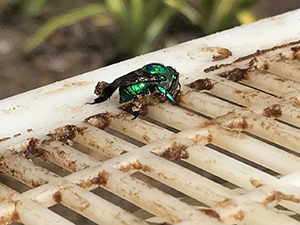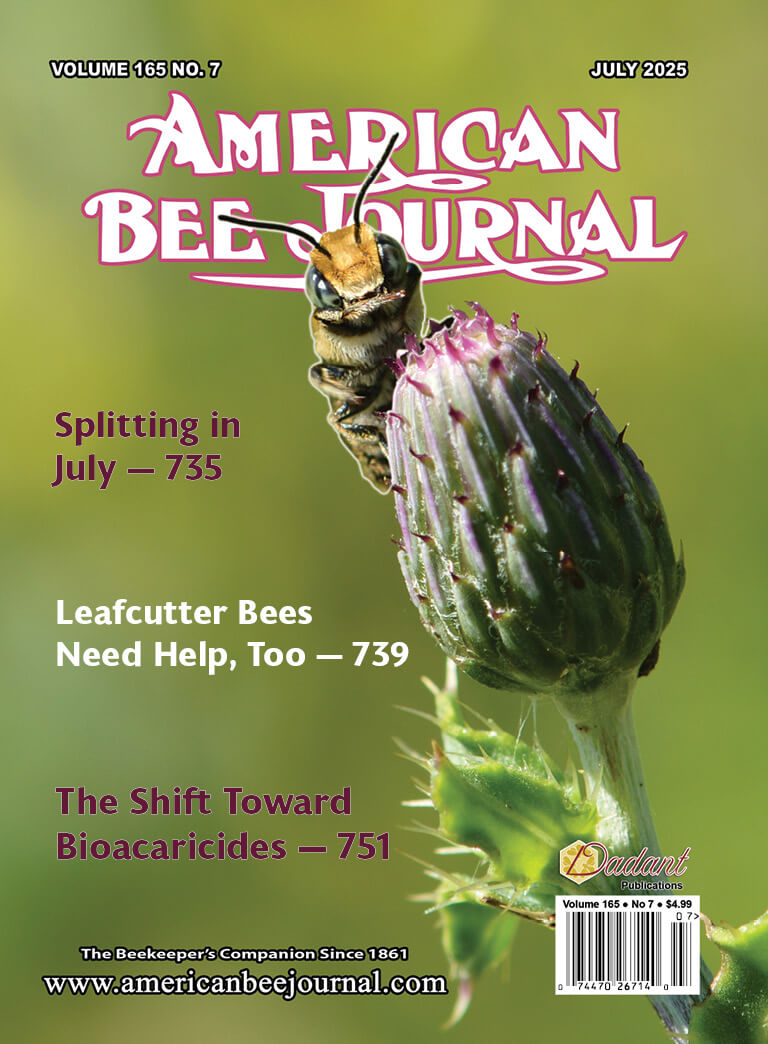
MY PROPOLIS CLEANING CREW
I live on the beachside in east-central Florida just east of Melbourne (town of Indialantic). Although there are a few negatives to beekeeping here (e.g. wild colonies are often Africanized, woodenware rots much faster, and queens wear out twice as fast), there are some decided positives as well. These include beekeeping year around, no winter prep of hives, and nectar flows from February through November.
I recently discovered another advantage, i.e. exploiting a recently introduced species of orchid bee to clean gunk from queen excluders.
For me, gummed up queen excluders have always been a significant annoyance and an object of procrastination. Online blogs and forums list several ways to clean propolis and wax from queen excluders including
heat gun, hot water, solar wax melter, hot pressure-wash, various solvents, special scraper tool, hive tool followed by stiff bristle brush, freeze the excluder and then flex or bang it and, believe it or not, releasing a team of bantam chickens. Most are time consuming and messy.
Several years ago, I noticed iridescent green bees, slightly smaller than a honey bee, that curiously hovered in a perfectly stationary mode about eye level, only to zip away for a second or two to drive away an interloper, and then to return to exactly the same spot in mid-air.
I did some research and learned they are Green Orchid Bees (Euglossa dilemma), a recent introduction from Central America. They were first collected in Broward County, FL, about 160 miles to the south of my location in 2003 by USDA specialists working on fruit fly monitoring. The bees are thought to have arrived from Mexico, perhaps concealed on a wooden pallet.
Males have an enlarged, hollow hind tibia with a hole and spongy material inside. They visit orchids in their native environs or alternative sources of fragrances in Florida such as basil or resins oozing from rotten wood. Volatile essences are stored in the hollow chamber and then thought to be «spray ventilated» to attract females. In contrast, females have typical corbiculae (pollen baskets) on their hind legs for collecting pollen and plant resins. They build their nests with propolis.
When I read that last fact, I began to wonder. I scraped some propolis from a hive during an inspection and put a sticky blob on a flat surface near an orchid bee’s “territory”, i.e. where I had seen one hovering. Sure enough, within minutes, a ….
KEEP THE GREAT ARTICLES COMING
I accumulate various magazines so that I can read them on long airplane flights. I usually have a large stack and on a recent trip I read two articles in the April 2018 edition that were very especially moving for this “newbee” beekeeper.
The Detroit Hives story by Rusty Burlew was terrific — I have fond memories of visiting family near Detroit and to see the rebirth of that city by bringing in the bees is not only needed but also an immensely uplifting story.
I loved the article by Kane M. titled “Grant Me the Courage” — this story alone is well worth the subscription price. What a great outreach for local beekeeping associations to partner with local prisons — I will check with our county association to see if we already provide this support or whether we could start one.
I also have a confession — I noticed the address label said that my subscription expired in November so please sign me up for another year and please keep the great articles coming. Thanks, and I will try to stay more current on my reading!
Phil Wenzell
Xenia, Ohio
THANKS FOR THE BIG PICTURE
Dear Mr. Linder,
Thank you for writing the article, “Modern Farm Myths” for the American Bee Journal. And I am thankful that the ABJ chose to print it. Spending nearly all of my life in non-ag areas of New Jersey and New York has kept me fairly ignorant about farming.
When I was about 21 or 22 years old, a friend of mine said to me, “You’re either growing, or backsliding.” Now, he said this in regard to one’s relationship with Jesus, as I was closely involved with an evangelical group called the Navigators at the time, but I have been able to translate that into my life in general. We cannot ever stop learning nor close our eyes to information outside of what we tend to see while wearing blinders. This article gave me a great deal of understanding to the farming picture of the nation, and made me think more of the “Big Picture” of agriculture.
The photos and graphs were also very helpful. I looked up the term “pellet alfalfa,” rather than read past it, and I learned something new!
For me, the best line of the article was, “When the monoculture suits our needs, we tend to be silent.” How true!
Best wishes,
Joe Treimel, age 68 and a beekeeper for 38 years
Carmel, New York


